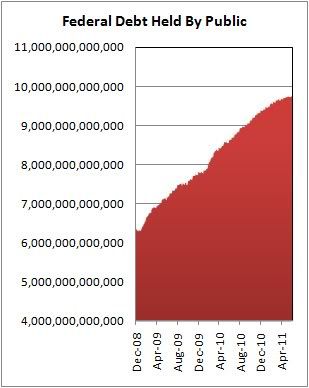From the Washington Post article Obama, Democrats not ready to play 14th Amendment card with debt ceiling
I am surprised that this hasn't come up before.
The article goes on to say that the Administration doesn't want to do this.
The reason that they don't is that the politics around debt ceiling votes are as important to the Democrats as they are to the GOP.
The NYT has a brief history of the politics around the 78 debt ceiling votes that have occurred since 1917 in Frugality Is a Virtue, but Politics Rule the Debt-Limit Fight.
Neither side wants to give up this bargaining chip.
Law professors, Democratic senators and liberal commentators have recently raised a tantalizing possibility for ending the congressional wrangling over raising the federal limit on borrowing:
President Obama could simply declare the debt ceiling unconstitutional and be done with it.
Advocates of this approach cite the 14th Amendment of the Constitution, which states that “[t]he validity of the public debt of the United States ... shall not be questioned.”
I am surprised that this hasn't come up before.
The article goes on to say that the Administration doesn't want to do this.
On Wednesday at a White House question-and-answer session held via the Web service Twitter, Obama said the debate over raising the $14.3 trillion debt ceiling shouldn’t become a constitutional question.
“I don’t think we should even get to the constitutional issue. Congress has a responsibility to make sure we pay our bills. We’ve always paid them in the past,” Obama said. “The notion that the U.S. is going to default on its debt is just irresponsible.”
The reason that they don't is that the politics around debt ceiling votes are as important to the Democrats as they are to the GOP.
The NYT has a brief history of the politics around the 78 debt ceiling votes that have occurred since 1917 in Frugality Is a Virtue, but Politics Rule the Debt-Limit Fight.
The president needed an increase in the federal debt limit. His partisan adversary, a powerful Ohio congressman, wanted something in return: deep spending cuts.
The president was Richard M. Nixon, the congressman was Charles A. Vanik and the year was 1970. Mr. Vanik, a Democrat on the Ways and Means Committee, did not win his $6 billion in spending cuts (equivalent to $34 billion today).
Neither side wants to give up this bargaining chip.

